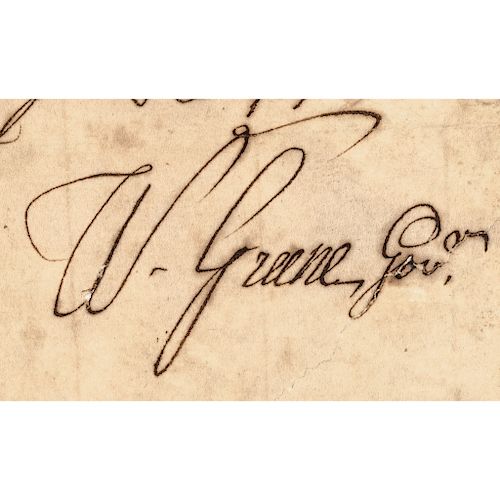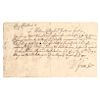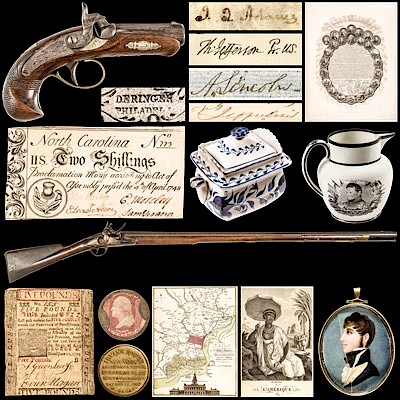(WILLIAM ELLERY, JR.) 1757 Rhode Island Naval Appointment
Lot 33
Categories
Estimate:
$3,000 - $4,000
Absentee vs Live bid
Two ways to bid:
- Leave a max absentee bid and the platform will bid on your behalf up to your maximum bid during the live auction.
- Bid live during the auction and your bids will be submitted real-time to the auctioneer.
Bid Increments
| Price | Bid Increment |
|---|---|
| $0 | $10 |
| $200 | $20 |
| $300 | $25 |
| $500 | $50 |
| $1,000 | $100 |
| $2,000 | $200 |
| $3,000 | $250 |
| $5,000 | $500 |
| $10,000 | $1,000 |
| $20,000 | $2,000 |
| $30,000 | $2,500 |
| $50,000 | $5,000 |
| $100,000 | $10,000 |
| $200,000 | $20,000 |
| $300,000 | $25,000 |
| $500,000 | $50,000 |
About Auction
By Early American History Auctions
Oct 19, 2019
Set Reminder
2019-10-19 12:00:00
2019-10-19 12:00:00
America/New_York
Bidsquare
Bidsquare : Historic Autographs-Currency-Political-Americana-Militaria-Guns
https://www.bidsquare.com/auctions/early-american-history-auctions/historic-autographs-currency-political-americana-militaria-guns-4513
326 Lots of Rare, Historic Autographs, Americana, Civil War Era, George Washington, Abraham Lincoln, Black History, Revolutionary War Era, Colonial America, Federal Period, War of 1812, Colonial Currency, Indian Peace Medals & more... Early American History Auctions auctions@earlyamerican.com
326 Lots of Rare, Historic Autographs, Americana, Civil War Era, George Washington, Abraham Lincoln, Black History, Revolutionary War Era, Colonial America, Federal Period, War of 1812, Colonial Currency, Indian Peace Medals & more... Early American History Auctions auctions@earlyamerican.com
- Lot Description
Autographs
Declaration of Independence Signer William Ellery's French & Indian War Naval Appointment
(WILLIAM ELLERY) (1727 - 1820). Signer of the Declaration of Independence for Rhode Island,"Son of Liberty," 1776 Delegate to the Continental Congress from Rhode Island and on its Marine Committee, Naval Officer for the Colony and appointed Continental Congress Loan Office Commissioner for the State, etc.
WILLIAM GREENE, Revolutionary War Governor of Rhode Island and Chief Justice of the Colony.
May 6, 1757-Dated French and Indian War Era, Autograph Document Signed, "W. Greene, Govr.," 1 page, measuring 5.75" x 9.75," Very Fine. A Unique historical Document where Governor William Greene of Rhode Island authorizes William Ellery Jr., Appointed Naval Officer, to act on behalf of the Colony of Rhode Island in all matters pertaining to his office. The Governor's bold 2.75" long signature appears in the lower right, and on the left, a star shaped paper covers the embossed, red wax Official Seal. This boldly written impressive Manuscript Document Appointment reads in full (punctuation added):
"Colony Rhode Island & (etc.) - To William Ellery Junr. - Gentleman Greeting - You being appointed Naval officer for said Colony for the year pursuing, are hereby authorized and fully impowered (sic) To act and Do in all things fully, amply and effectually, so far as Relates to said office, according to Law, and for Doing, this shall be your Sufficient warrant. Given Under My hand and Seal in said Colony the 6th Day of May in the thirtieth year of his Majesty's Reign A D 1757 - (Signed) W. Greene, Govr."
This rare Document has been archivally backed for preservation, sealing two edge tears, one of which extends through the abbreviation "Govr" after the signature. Otherwise this Colonial Naval Document is in excellent overall condition.
William Ellery (December 22, 1727 - February 15, 1820) was a Signer of the United States Declaration of Independence as a representative of Rhode Island. In 1764, the Baptists consulted with Ellery and the Congregationalist Reverend Ezra Stiles on writing a charter for the college that became Brown University. However, Ellery and Stiles attempted to give control of the college to the Congregationalists, but the Baptists withdrew the petition until it was rewritten to assure Baptist control. Neither Ellery nor Stiles accepted appointment to the reserved Congregationalist seats on the board of trustees
The second son of William Ellery Sr. and Elizabeth Almy, William Ellery was born in Newport and received his early education from his father, a merchant and Harvard College graduate. In 1747 William Ellery graduated from Harvard College where he had excelled in Greek and Latin. Ellery returned to Newport where he worked first as a merchant, next as a customs collector, and then as Clerk of the Rhode Island General Assembly. Ellery started practicing law in 1770 at the age of 43 and became active in the Rhode Island Sons of Liberty.
After Samuel Ward's death in 1776, Ellery replaced Ward in the Continental Congress. Ellery was among the fifty-six signers of the Declaration of Independence in 1776. Ellery also served as a judge of the Supreme Court of Rhode Island and by 1785 he had become an Abolitionist. He was the first customs collector of the port of Newport under the Constitution, serving there until his death. Ellery was an active worshipper at the Second Congregational Church of Newport. After his death in 1820 at age 92, William Ellery was buried in Common Burying Ground in Newport.
- Shipping Info
-
Early American provides in-house worldwide shipping. Please contact us directly if you have questions about your specific shipping requirements.
-
- Buyer's Premium



 EUR
EUR CAD
CAD AUD
AUD GBP
GBP MXN
MXN HKD
HKD CNY
CNY MYR
MYR SEK
SEK SGD
SGD CHF
CHF THB
THB












